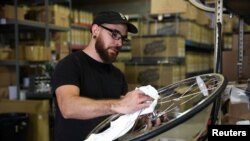When Mehdi Farsi decided to move production of his company’s bicycles out of China to escape U.S. tariffs, it took him months to find another factory in Asia.
Farsi opened State Bicycle Co with his brother in 2009. It is based in the American state of Arizona.
He first turned to Taiwan. But he found that most factories there were so busy with business from competitors that they turned down his “low volume and less profitable” orders.
Farsi’s struggle represents the difficulties that many U.S. companies have faced during the trade war between the world’s two biggest economies.
A 'gift' to other countries
A “phase 1” trade deal between the United States and China was signed earlier this week. But the deal does not change much for Farsi and others in the bicycle business. The 25-percent tariffs on bicycles and most bike parts remain in place.
Bicycle companies are moving their operations to Taiwan, Thailand, Vietnam and other places in Asia. But factories outside of China often lack the ability to take in everyone seeking a new base. That has increased the costs of moving and finding new suppliers.
Some U.S. companies say it now makes more sense to just accept the tariff costs and continue manufacturing in China.
After months of research and several trips, Farsi finally found a small Taiwanese factory willing to make his specialty bicycles. But Farsi had to triple orders and pay 30 percent of the cost of goods at the start. When he worked with a factory in China, he only paid after delivery of the products.
Gina Chang is secretary general of the Taiwan Bicycle Association. She called the China-U.S. trade war a “Christmas gift” for Taiwan. But she said the island’s limited capacity meant some manufacturers had turned down business to work on existing orders -- which mostly include electronic bikes from Europe.
Taiwan’s U.S. bicycle exports jumped 37 percent in the first 10 months of 2019, the association reports. But Chang said manufacturers resisted expanding production lines; they feared orders might drop if the trade war ended.
Moving production back to the U.S.
To help bicycle companies, the administration of U.S. President Donald Trump has been offering tariff exclusions to some of their imports since September 2019. The administration announced additional exclusions earlier this year for electronic bikes and for most children’s bikes.
The exclusions, however, are only for one year. And, they are meant to give companies more time to move production - hopefully to the United States.
But Don DiCostanzo of Pedego Electric Bikes in California said higher labor costs and the lack of a strong supply base have made it nearly “impossible” to produce bikes in the United States.
DiCostanzo did look into setting up a U.S. factory. But he said production costs would have doubled. Instead, he moved Pedego’s production to Vietnam in December 2018. “Even if they slap 100 percent tariffs on bicycles, I’m not sure that will be enough to bring production back to the U.S,” he said.
Farsi said he did not even consider moving production to the United States. And ongoing concerns about tariffs left him no choice but to stay invested in Taiwan.
In the 1970s, the United States produced more than 15 million bicycles a year. Now it makes fewer than 500,000. Those numbers are from industry data presented to the United States Trade Representative (USTR) in 2018.
China, on the other hand, made about 95 percent of the bikes sold in the U.S. in 2018.
I’m Ashley Thompson.
The Reuters news agency reported this story. Ashley Thompson adapted it for VOA Learning English. Hai Do was the editor.
____________________________________________________________
Words in This Story
tariffs - n. a tax on goods coming into or leaving a country
volume - n. an amount of something
triple - v. to cause (something) to become three times as great or as many
capacity - n. the ability to hold or contain people or things
exclusion - n. the act of leaving (something) out of something





